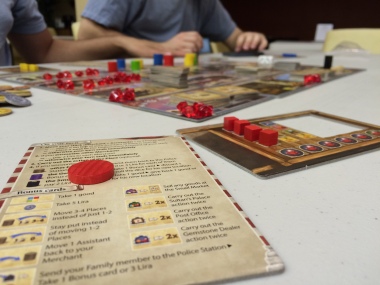Board game designers and developers put a lot of work in to make sure a game is balanced. It takes many playtest sessions and in some cases, many spreadsheets to crunch the numbers to ensure balance – that one strategy is not too powerful, that one mechanic does not break the game, or that turn order does not give advantages to certain players. One solution I have seen in many games to better balance turn order is to give more starting resources or currency to players going further down in turn order. For example, the first player would start with $3, second starts with $4, etc. The designers realize that taking a turn second, third, or last gives a distinct disadvantage with many mechanisms to the first player – for example, in a worker placement game, the best spots may be taken by the time my turn comes around. I am compensated by having more resources which could allow me more flexibility. Some games I have recently played that uses this type of balance includes Istanbul (each player gets one more lira in turn order), Alien Frontiers (each player gets additional starting resources in turn order), and Hansa Teutanica (each player gets additional starting traders in turn order).
and developers put a lot of work in to make sure a game is balanced. It takes many playtest sessions and in some cases, many spreadsheets to crunch the numbers to ensure balance – that one strategy is not too powerful, that one mechanic does not break the game, or that turn order does not give advantages to certain players. One solution I have seen in many games to better balance turn order is to give more starting resources or currency to players going further down in turn order. For example, the first player would start with $3, second starts with $4, etc. The designers realize that taking a turn second, third, or last gives a distinct disadvantage with many mechanisms to the first player – for example, in a worker placement game, the best spots may be taken by the time my turn comes around. I am compensated by having more resources which could allow me more flexibility. Some games I have recently played that uses this type of balance includes Istanbul (each player gets one more lira in turn order), Alien Frontiers (each player gets additional starting resources in turn order), and Hansa Teutanica (each player gets additional starting traders in turn order).
For me, balancing for turn order in a board game aptly illustrates social injustices in our systems and institutions and why we need to focus on equity instead of equality. I define equity on my blog as “being fair and impartial; equity does not imply equality” and equality as “the state of being equal.” In certain board games, the designer realizes that player turn order inherently disadvantages players going last or close to last. If the designer chose to keep the starting resources the same for all players, it would be very unlikely for the player going last to win the game (although it might happen on occasion). This would be an equal start. If this were the case, I am sure many game reviewers would come out and criticize the game for being unbalanced. The solution would be an equitable start, distributing resources differently to level the playing field.
The same happens in real life, although it may be more nuanced and definitely harder to combat. Due to systemic oppression, certain groups of people start off with more disadvantages or advantages than other groups of people. Giving people equal resources does not necessarily fix the issues. I recently went to a talk given by Dr. Maura Cullen, one of the founding faculty members of the Social Justice Training Institute. She gave a great and simplistic illustration of equality versus equity, which I want to share with you now:
Equality is like giving everyone a pair of size 8 women’s shoes. Regardless of your shoe size, you got a size 8 women’s shoe. Obviously, the shoe is going to fit some people better more than others and we all will try our best to cope with what we have. Now, let’s imagine that every month we will run a race with those shoes. The race represents how oppression is institutionalized. The winners of the race will have get wealth, access to resources, opportunities in the job market, investments, access to food, the “best” land, etc. Did I choose my shoe size? No… but a system was set up to reward folks with a certain size of foot and disadvantage everyone else. Will the best runners win the race? Arguably, no. More often than not, the people with size 8 women’s feet will finish closer to the top. Yes, some of the best runners will be able to place higher without the correct shoe size; however, this would not be a common occurrence. Oh the other hand, equity would be having everyone gets a pair of shoes in their own size.
Equality is a good goal, don’t get me wrong, AND equality only works if we start on a level playing field. This isn’t about reversing the groups of privilege and oppression (i.e., having the wealthy give all their money so that they are now low socioeconomic status). This is about redistributing some of the wealth and opportunities; this is about changing some of our systems, so that all players whether you go first or last have a chance at winning the game. We pay attention to this very aspect when designing and playing games. Why don’t we pay more attention to it when it comes to our institutions, culture, and systems?
Discussion
No comments yet.